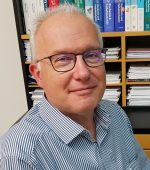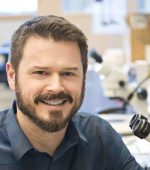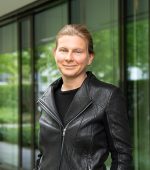Plenary Lectures

Freda Miller
Michael Smith Laboratories, The University of British Columbia, Vancouver, Canada
L01: From development to repair – how growth factors and stem cells build the nervous system
Saturday, July 8, 2023, 12:30 – 13:30 h
Freda Miller is currently a Professor in the Michael Smith Laboratories and Department of Medical Genetics at the University of British Columbia. After obtaining her scientific training in Canada and the U.S., she held faculty positions at the University of Alberta, McGill and University of Toronto/Hospital for Sick Children prior to her recent move to Vancouver in 2020. She is best known for her studies of neural and dermal stem cells and for her work elucidating how growth factors regulate cell genesis, survival and growth in the nervous system. In recognition of this work, she is an elected fellow of the AAAS and the Royal Society of Canada, has won numerous awards including an HHMI Senior International Research Scholarship, and recently had an elementary school named for her in Calgary. Dr. Miller has also founded two biotechnology companies and has significant experience in scientific society leadership.

Michael Wegner
Institute for Biochemistry, FAU Erlangen-Nürnberg, Germany
L02: Organizing and adapting the gene regulatory network in myelinating glia
Saturday, July 8, 2023, 19:00 – 20:00 h
Michael Wegner studied biology at the universities of Münster and Würzburg and did his doctoral studies from 1987 to 1990 at the Institute of Biochemistry in Würzburg. After postdoctoral work at the University of California at San Diego (UCSD) he took over a position as leader of a junior research group at the Center for Molecular Neurobiology at Hamburg University (ZMNH) in 1994 and was appointed to the chair of Biochemistry and Pathobiochemisty at the Institute of Biochemistry of the Medical Faculty at the Friedrich-Alexander-University Erlangen-Nürnberg in 2000. His research is dealing with the transcriptional and epigenetic control of glial cells and myelin formation.

Marc Freeman
Oregon Health & Science University, The Vollum Institute, Portland, USA
L03: Modulation of astrocyte signaling during circuit activity
Sunday, July 9, 2023, 08:30 – 09:30 h
Marc Freeman is a Professor and the Director of the Vollum Institute. He earned his B.S. in Biology from Eastern Connecticut State University in 1993. He carried out his doctoral training in the laboratory of John Carlson at Yale University, where he studied Drosophila olfaction and behavior. Freeman trained as a postdoctoral associate with Chris Doe at the University of Oregon from 1999–2004, studying Drosophila embryonic neurogenesis. He started his laboratory in the Department of Neurobiology at The University of Massachusetts Medical School in 2004. Freeman was selected as a Smith Family New Investigator (2004), an Alfred P. Sloan Research Fellow (2005), and a Howard Hughes Medical Institute Early Career Scientist (2009–2013). He was an HHMI Investigator from 2013 to 2016, until he resigned that position to move to the Vollum Institute in 2016.
The Freeman laboratory explores the cell biology of axons, neuron-glia signaling, and glial cell function in the developing and mature brain. Relevant to this proposal, our group developed the first Drosophila models of Wallerian degeneration (axon degeneration after axotomy) and exploited a battery of fly genetic tools to discover dSarm/Sarm1—the first endogenous molecule shown to actively drive axon destruction, and which is conserved in flies, mouse, and humans. Remarkably, Sarm1 loss suppresses axon degeneration for weeks after axon injury and appears to fully preserve the functional integrity of axon fibers in vivo, even when they are fully separated from their cell bodies. In subsequent work we defined additional members of the axon death signaling cascade and demonstrated that blockade of Sarm1-mediated axon death signaling suppresses multiple types of axon loss in mammalian models of disease. We are now deeply immersed in further defining components of the axon death signaling cascade, determining their roles in disease, and exploring puzzling questions in axon biology—for instance, how can an axon survive and maintain its connections for weeks in vivo without a cell body?

Shane Liddelow
NYU Grossman School of Medicine, New York, USA
L04: Novel reactive astrocyte sub-states and function
Sunday, July 9, 2023, 18:00 – 19:00 h
Shane Liddelow gained his Bachelors of Science (Hons) and Biomedical Science from the University of Melbourne, Australia, majoring in Neuroscience and Anatomy & Cell Biology. He received his PhD in Pharmacology also from the University of Melbourne where he researched the protective barriers of the brain during early development, specifically investigating ways to augment this system for delivery of drugs to the central nervous system.
As a postdoctoral fellow in the lab of Ben Barres at Stanford University his research focused on astrocytes. His research showed that one form of reactive astrocyte is induced by factors released by microglia. These astrocytes, present in the brains of patients with several neurodegenerative diseases, release a toxic factor that kills certain neurons. Further investigation in his independent lab at NYU Grossman School of Medicine uncovered that toxic lipids produced by specific reactive astrocytes were responsible for this neuron cell death. His lab continues to uncover new sub-states of reactive astrocytes – producing novel models and tools to study their function and determine their role in infection and disease.
He has authored over 70 papers and received numerous awards including the NHMRC (Australia) CJ Martin Training Award (2012-2016) and the Glenn Foundation award for Aging in 2016. He has also received the Inge Grundke-Iqbal Award from the Alzheimer’s Association (2019), the David Hague Early Career Investigator of the Year Award from the Alzheimer’s Research UK (2020), and the Janett Rosenberg Trubatch Career Development Award from the Society for Neuroscience (2021). In 2021 he was appointed as co-Director of the Parekh Center for Interdisciplinary Neurology and Grossman School of Medicine.
Our work focuses on the mechanisms that induce different forms of reactive astrocytes, and how these reactive cells interact with other cells in the CNS in a positive or negative way. We use high throughput single cell and bulk RNA sequencing, and spatial transcriptomics to investigate the heterogeneity of astrocytes in multiple species. We also take advantage of genetic engineering and modern in vitro modeling to interrogate disease mechanisms and interaction with other CNS cells that change between health and disease.
We apply this knowledge to reactive astrocytes in human disease, and believe that the discovery of astrocytes with different reactive states has important implications for the development of new therapies for CNS injury and diseases.

Ragnhildur Thora Karadottir
Department of Veterinary Medicine, Cambridge, UK
L05: Neuronal activity modulates myelin plasticity and regeneration
Monday, July 10, 2023, 08:30 – 09:30 h
Ragnhildur Thóra Káradóttir is the Director of the Cambridge Centre for Myelin Repair and a Professor of Cellular Neuroscience at the University of Cambridge, UK.
She did her undergraduate degree in Biochemistry at the University of Iceland and for her postgraduate training, she entered the Wellcome Trust 4-year PhD Programme in Neuroscience at UCL. After her PhD she was awarded the Dorothy Hodgkin Fellowship of the Royal Society, followed by a Wellcome Trust Career Development Research Fellowship to establish her own group at the Universty of Cambridge.
She has been the recipient of several awards, e.g., the Lister Institute Research Prize, the Allen Distinguished Investigator Award, and was elected to the FENS-Kavli Network of Excellence.
Her main research interest is to understand how neuronal activity can regulate oligodendrocyte precursor cell (OPC) differentiation and myelin plasticity in health and disease.

Anne Schaefer
Icahn School of Medicine at Mount Sinai, New York, USA
L06: The operational principles of neuron-microglia circuits
Tuesday, July 11, 2023, 08:30 – 09:30 h
Dr. Anne Schaefer is a Professor in the Department of Neuroscience and Psychiatry, Vice-Chair of Neuroscience and Director of the Center for Glial Biology at the Friedman Brain Institute at Icahn School of Medicine at Mount Sinai, New York. Most recently, she became a Director at the Max Planck Institute for Aging in Cologne, Germany. Dr. Schaefer did her graduate studies at the Johannes Gutenberg University Mainz, the Charité University Berlin and The Rockefeller University in New York. She joined Mount Sinai to start her own laboratory in 2011 after the completion of her postdoctoral studies in Dr. Paul Greengard’s Laboratory at The Rockefeller University, New York. Her most recent work describes previously unknown mechanisms of microglia-mediated regulation of neuronal activity and survival. Dr. Schaefer has been awarded with the NIH Director’s New Innovator Award, the Inaugural Landis Mentoring Award for Outstanding Mentorship by the NIH, a NARSAD Young Investigator Award, Max Planck Sabbatical Award, and was named a Kavli Frontiers of Science Fellow by the National Academy of Sciences and Inventor of the Year 2018 by Mount Sinai.

Michelle Monje
Howard Hughes Medical Institute, Stanford University, USA
L07: Neuron-glial interactions in health and disease: from cognition to cancer
Tuesday, July 11, 2023, 12:45 – 13:45 h
Michelle Monje, MD, PhD, is a professor of Neurology and Neurological Sciences at Stanford University and a Howard Hughes Medical Institute Investigator. Her research program focuses at the intersection of neuroscience, immunology and brain cancer biology with an emphasis on neuron-glial interactions in health and oncological disease. Her laboratory studies how neuronal activity regulates healthy glial precursor cell proliferation, new oligodendrocyte generation, and adaptive myelination; this plasticity of myelin contributes to healthy cognitive function, while disruption of myelin plasticity contributes to cognitive impairment in disease states like cancer therapy-related cognitive impairment. Her lab discovered that neuronal activity similarly promotes the progression of malignant gliomas, driving glioma growth through both paracrine factors and through electrophysiologically functional neuron-to-glioma synapses. Dr. Monje has led several of her discoveries from basic molecular work to clinical trials. Her work has been recognized with numerous honors, including an NIH Director’s Pioneer Award, a MacArthur Fellowship and election to the National Academy of Medicine.
In the central nervous system, neuronal activity is a critical regulator of development and plasticity. Activity-dependent proliferation of healthy glial progenitors, oligodendrocyte precursor cells (OPCs), and the consequent generation of new oligodendrocytes contributes to adaptive myelination. This plasticity of myelin tunes neural circuit function and contributes to healthy cognition. The robust mitogenic effect of neuronal activity on normal oligodendroglial precursor cells, a putative cellular origin for many forms of glioma, suggests that dysregulated or “hijacked” mechanisms of myelin plasticity might similarly promote malignant cell proliferation in this devastating group of brain cancers. Indeed, neuronal activity promotes progression of both high-grade and low-grade glioma subtypes in preclinical models. Crucial mechanisms mediating activity-regulated glioma growth include paracrine secretion of BDNF and the synaptic protein neuroligin-3 (NLGN3). NLGN3 induces multiple oncogenic signaling pathways in the cancer cell, and also promotes glutamatergic synapse formation between neurons and glioma cells. Glioma cells integrate into neural circuits synaptically through neuron-to-glioma synapses, and electrically through potassium-evoked currents that are amplified through gap-junctional coupling between tumor cells This synaptic and electrical integration of glioma into neural circuits is central to tumor progression in preclinical models. Thus, neuron-glial interactions not only modulate neural circuit structure and function in the healthy brain, but paracrine and synaptic neuron-glioma interactions also play important roles in the pathogenesis of glial cancers. The mechanistic parallels between normal and malignant neuron-glial interactions underscores the extent to which mechanisms of neurodevelopment and plasticity are subverted by malignant gliomas, and the importance of understanding the neuroscience of cancer.
Gibson EM, Purger D, Mount CW, Goldstein AK, Lin GL, Inema I, Miller SE, Bieri G, Zuchero JB, Barres BA, Woo PJ, Vogel H, Monje M (2014) Neuronal activity promotes adaptive oligodendrogenesis and myelination in the mammalian brain. Science, 344 (6183):487; 344:1252304.
Venkatesh HS, Johung T, Caretti V, Noll A, Tang Y, Nagaraja S, Gibson EM, Mount CW, Pollepalli J, Mitra SS, Woo PJ, Malenka RM, Vogel H, Bredel M, Mallick P, Monje M (2015) Neuronal activity promotes glioma growth through neuroligin-3 secretion, Cell, 161(4):803-16
Venkatesh HS, Tam LT, Woo PJ, Nagaraja S, Gillespe SM, Lennon J, Ni J, Duveau DY, Morris PJ, Zhao JJ, Thomas CJ, Monje M (2017) Targeting neuronal activity-regulated neuroligin-3 dependency for high-grade glioma, Nature 549: 533-537
Venkatesh HS, Morishita W, Geraghty AC, Silverbush D, Gillespie SM, Arzt M, Tam LT, Espenel C, Ponnuswami A, Ni L, Woo PJ, Taylor KR, Agarwal A, Regev A, Brang D, Vogel H, Hervey-Jumper S, Bergles DE, Suvà ML, Malenka RC and Monje M (2019) Electrical and synaptic integration of glioma into neural circuits Nature 573: 539-545
Pan Y, Hysinger JD, Barron T, Schindler NF, Cobb O, Guo X, Yalcin B, Anastasaki C, Mulinyawe SB, Ponnuswami A, Schaeffer S, Ma Y, Chang K-C, Toonen JA, Lennon JJ, Gibson EM, Huguenard JR, Liau LM, Goldberg J, Monje M*, Gutmann DH* (2021) NF1 mutation drives neuronal activity-dependent optic glioma initiation. Nature. 594(7862):277-282
